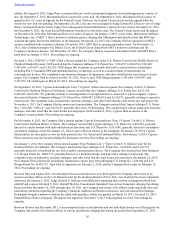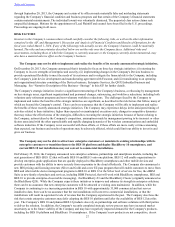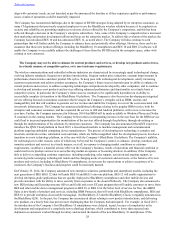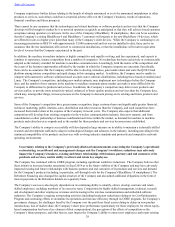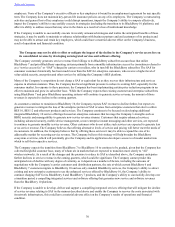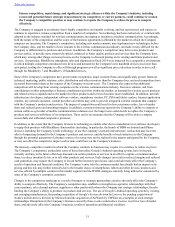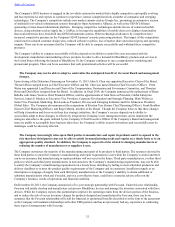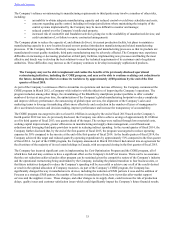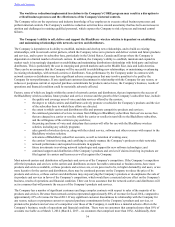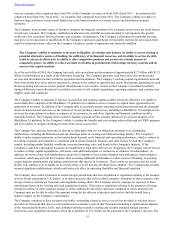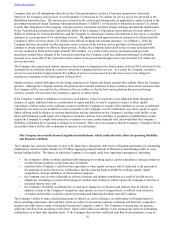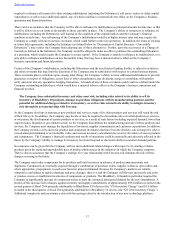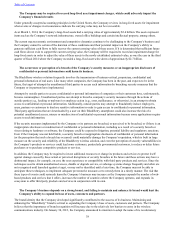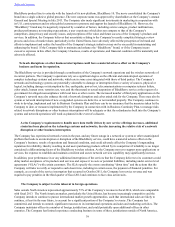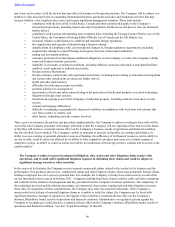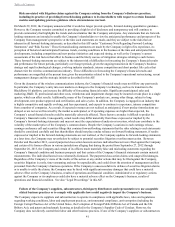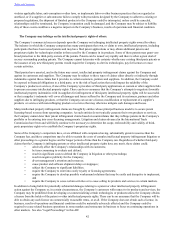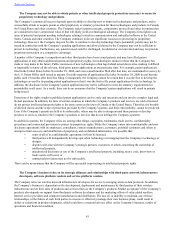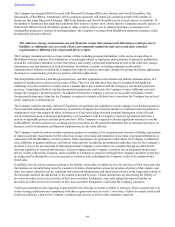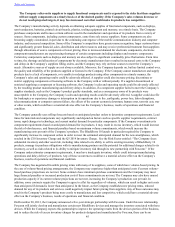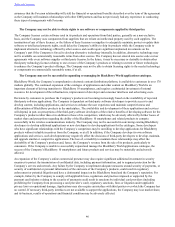Blackberry 2014 Annual Report Download - page 44
Download and view the complete annual report
Please find page 44 of the 2014 Blackberry annual report below. You can navigate through the pages in the report by either clicking on the pages listed below, or by using the keyword search tool below to find specific information within the annual report.
36
Company does not sell smartphones directly into the Venezuelan market, nor does it have any operations in Venezuela.
Moreover, the Company only invoices its carrier partners in Venezuela in U.S. dollars for service access fees provided to the
BlackBerry subscriber base. The invoices are reviewed by the carriers and subsequently, an application is made by them to the
government-operated Foreign Exchange Administration Board (“CADIVI”) in Venezuela to obtain the necessary U.S. dollars
to settle their obligations to the Company. Foreign currency restrictions and other foreign exchange mechanisms implemented
by the Venezuelan government have impacted the ability of the Company’s Venezuelan carrier partners to timely obtain U.S.
dollars in exchange for Venezuelan Bolivars, and the Company is continuing to monitor development in this area as it considers
strategies to secure payment of its outstanding invoices. The application and approval process continue to be delayed and the
Company's ability to timely obtain U.S. dollars at the official exchange rate remains uncertain. As of March 1, 2014, the
Company has been successful in collecting some service revenues from wireless service providers in Venezuela and will
continue to closely monitor its efforts in future periods. Further, the Company deferred all service revenue associated with
services rendered in fiscal 2014 of approximately $261 million. As a result of the currency devaluation and given the
uncertainty around future changes to the Venezuela leadership, the Company could face additional challenges in obtaining
payment on its receivables if the Venezuela carriers cannot secure governmental approvals to buy and remit U.S. dollars for
services provided.
The Company also experienced similar currency-related issues in Argentina in the fourth quarter of fiscal 2014, which led to the
deterioration of collections from the carriers to whom the Company provides services. As a result, the Company recorded a
service revenue deferral of approximately $13 million of service revenue associated with service access fees charged to
customers in Argentina in the fourth quarter of fiscal 2014.
Similar currency control challenges are also being experienced in Nigeria and Egypt, among other markets where the Company
operates. Although the Company monitors the political and economic situations in these countries, there are no assurances that
the Company will be successful in the collection of its receivables, or that the laws and regulations that governs foreign
currency controls will not reduce the Company’s capacity to collect funds.
If the Company is unable to maintain or increase its cash balance, it may be required to raise additional funds through the
issuance of equity, additional debt or a combination of equity and debt, or may be required to reduce or delay capital
expenditures, further reduce costs, reallocate resources within the Company or consider other alternatives. Access to additional
capital may not, however, be available on terms acceptable to the Company or at all. Furthermore, any future equity or equity-
linked offering could be dilutive to existing shareholders and any drawdown on the Company’s existing credit facility or any
future debt financing would require the Company to dedicate a portion of its cash flow to payments on indebtedness, would
require the Company to comply with restrictive covenants or to meet certain financial tests, and would limit the Company’s
flexibility in planning for or reacting to changes in its business. There can be no assurance that the Company’s strategies will be
successful or that it will be able to maintain or increase its cash balance.
The Company has recently incurred significant indebtedness, which could adversely affect its operating flexibility
and financial condition.
The Company has, and may from time to time in the future have, third-party debt service obligations pursuant to its outstanding
indebtedness, which currently includes $1.25 billion aggregate principal amount of Debentures and drawings under its asset-
backed lending facility. The degree to which the Company is leveraged could have important consequences, including:
• the Company’s ability to obtain additional debt financing for working capital, capital expenditures, strategic initiatives
or other business purposes in the future may be limited;
• a portion of the Company’s cash flow from operations or other capital resources will be dedicated to the payment of
the principal of, and/or interest on, indebtedness, thereby reducing funds available for working capital, capital
expenditures, strategic initiatives or other business purposes;
• the Company may be more vulnerable to adverse economic and industry conditions as a result of its debt service
obligations, including as a result of borrowings at variable rates of interest, which exposes the Company to the risk of
increased interest rates; and
• the Company’s flexibility in planning for, or reacting to changes in, its business and industry may be limited. In
addition, certain of the Company’s competitors may operate on a less leveraged basis, or without such restrictive
covenants and therefore could have greater generating and financing flexibility than the Company.
The Company’s ability to make scheduled payments of interest on, and to refinance, its indebtedness will depend upon its
future operating performance and cash flow, which are subject to prevailing economic conditions and financial, competitive,
business and other factors, many of which are beyond the Company’s control. The Company’s business may not generate
sufficient cash flow from operations in the future, which could result in its inability to pay amounts due under its outstanding
indebtedness or to fund other liquidity needs. If the Company does not have sufficient cash flow from operations, it may be
Table of Contents


